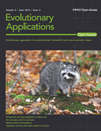
Evolutionary Applications
metrics 2024
Shaping Tomorrow's Science with Evolutionary Perspectives
Introduction
Evolutionary Applications, published by WILEY, is a premier Open Access journal that has been dedicated to advancing the field of evolutionary biology since its inception in 2008. Renowned for its impactful research, the journal currently boasts an impressive impact factor and is recognized within the Q1 category for Agricultural and Biological Sciences, Ecology, Evolution, Behavior and Systematics, and Genetics, reflecting its contribution to high-quality, peer-reviewed articles. With a Scopus rank placing it in the top percentiles of its respective categories, it serves as a vital resource for researchers, professionals, and students seeking to explore the applications of evolutionary science across various disciplines. The journal's commitment to Open Access from 2008 onwards facilitates wider dissemination and accessibility of cutting-edge research, making significant strides in the study of evolutionary processes and their implications for both ecological and genetic innovations.
Metrics 2024
 1.29
1.29 3.50
3.50 4.20
4.20 88
88Metrics History
Rank 2024
Scopus
IF (Web Of Science)
JCI (Web Of Science)
Quartile History
Similar Journals

Conservation Genetics Resources
Fostering Sustainable Ecosystems through Genetic ResearchConservation Genetics Resources, published by SPRINGER in Germany, is a key resource in the field of conservation science, focusing on the genetic aspects essential for biodiversity preservation and ecosystem management. With an ISSN of 1877-7252 and an E-ISSN of 1877-7260, this journal has established its presence as a vital platform for disseminating high-quality research that addresses the challenges of genetic conservation strategies. Notably, it has demonstrated a strong academic impact, currently holding a Q3 ranking in Ecology, Evolution, Behavior and Systematics and Q4 in Genetics for 2023, alongside Scopus ranks that position it as a notable contributor in its fields. This journal invites contributions that enhance the understanding of genetic diversity, population genetics, and conservation genomics, and it serves as an essential reference for researchers, professionals, and students committed to the preservation of our natural heritage. The access options are varied, catering to the needs of its diverse readership, and making it an indispensable addition to academic research spaces.

ECOLOGY LETTERS
Shaping the future of ecology with impactful findings.ECOLOGY LETTERS, published by Wiley, is a premier journal dedicated to advancing the field of ecology and related disciplines. Renowned for its rigorous peer-review process and impactful research contributions, the journal boasts an impressive Scopus Rank of #13 out of 721 in the category of Agricultural and Biological Sciences, positioning it in the 98th percentile globally. With a Q1 rating in the 2023 quartile rankings for Ecology, Evolution, Behavior and Systematics, it serves as an essential platform for ecologists and evolutionary biologists to disseminate cutting-edge research findings from 1998 to 2024. Although not an open-access journal, ECOLOGY LETTERS actively contributes to the global ecology discourse, making it a critical resource for researchers, professionals, and students dedicated to understanding complex ecological interactions and evolutionary processes.

HEREDITY
Exploring the Genetic Frontier: Insights from HEREDITYHEREDITY is a prestigious academic journal published by SpringerNature, specializing in the dynamic fields of Genetics and Genetics (Clinical). With a history of excellence since its inception in 1947, this journal has established itself as a significant contributor to the understanding of genetic research, addressing both foundational principles and clinical applications. Operating without an open access model, it maintains a strong reputation with an impact factor that reflects its rigorous peer-review process and high-quality submissions, ranking in the top quartiles of its category as evidenced by its Q2 classification in Genetics and Genetics (clinical) for 2023. Further, HEREDITY holds commendable positions in Scopus rankings, illustrating its influence within the field, currently placed #21 out of 99 in Medicine (Clinical Genetics) and #87 out of 347 in Biochemistry, Genetics, and Molecular Biology (Genetics). Researchers, professionals, and students are invited to explore the latest discoveries and advancements in genetics through this esteemed journal, contributing to the broader discourse and innovation within the field.
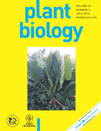
PLANT BIOLOGY
Connecting Researchers in Plant BiologyPLANT BIOLOGY is a prestigious academic journal published by Wiley, dedicated to advancing knowledge in the fields of plant science, ecology, and evolutionary biology. With an impressive impact factor and ranking in the Q1 category for Ecology, Evolution, Behavior and Systematics, and Plant Science as of 2023, it stands at the forefront of research dissemination. The journal encompasses a broad scope of plant biology topics, providing a critical platform for researchers to share innovative findings and foster interdisciplinary collaboration. Available in both print (ISSN: 1435-8603) and online formats (E-ISSN: 1438-8677), it ensures accessibility through open access options. As a crucial resource for professionals, researchers, and students alike, PLANT BIOLOGY cultivates a deeper understanding of plant systems and their ecological significance, making it an essential addition to the library of anyone dedicated to the study of biology and the environment.
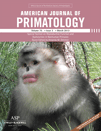
AMERICAN JOURNAL OF PRIMATOLOGY
Unlocking the Secrets of Primate EvolutionAMERICAN JOURNAL OF PRIMATOLOGY is a leading peer-reviewed journal published by Wiley that focuses on the rich and dynamic field of primate research. With an ISSN of 0275-2565 and an E-ISSN of 1098-2345, this esteemed journal has maintained its commitment to advancing knowledge in primatology since its inception in 1981. Recognized in the Q1 quartile for both Animal Science and Zoology and Ecology, Evolution, Behavior and Systematics, it is ranked 84th out of 490 in Animal Science, and 188th out of 721 in Ecology. By publishing high-quality research articles, reviews, and theoretical contributions, the journal aims to foster a deeper understanding of primate biology, conservation, and behavior, making it an invaluable resource for researchers, professionals, and students alike. While not an open access journal, it provides essential insights into primate science, ensuring that vital findings are accessible to a broad audience. For further details, visit their office at 111 River St, Hoboken 07030-5774, NJ, USA.

EVOLUTIONARY ECOLOGY
Illuminating Biodiversity Through Evolutionary PerspectivesEVOLUTIONARY ECOLOGY is a prestigious academic journal published by SPRINGER, exploring the intricate relationships between evolutionary processes and ecological dynamics since its inception in 1987. As a key resource in the field of Ecology, Evolution, Behavior, and Systematics, the journal is recognized for its impactful contributions, holding a commendable Q2 quartile ranking in its category as of 2023. With an emphasis on empirical and theoretical studies that bridge evolutionary biology with ecological principles, EVOLUTIONARY ECOLOGY is essential for researchers, practitioners, and students aiming to deepen their understanding of biodiversity, adaptation, and ecosystem functioning. Although it currently does not offer open access, the journal maintains a commitment to disseminating high-quality research that influences both foundational knowledge and practical applications in the field. Located in the Netherlands, the journal continues to serve a global audience, making significant contributions to advancing ecological and evolutionary research through rigorous scientific discourse and innovation.

Fishes is a premier academic journal dedicated to the exploration and dissemination of cutting-edge research in the fields of aquatic science and ecology. Published by MDPI in Switzerland, this open-access journal has been accessible to researchers globally since its inception in 2016, allowing for the rapid exchange of knowledge that fosters scientific advancement in the study of fish and aquatic ecosystems. With its convergence in the years 2016 to 2024, Fishes proudly holds a notable position in the academic community, evidenced by its category quartile rankings of Q3 in Aquatic Science and Q2 in Ecology for 2023. The journal consistently features innovative research encompassing ecological interactions, conservation strategies, and evolutionary studies within aquatic environments. By integrating interdisciplinary approaches and encouraging contributions from a diverse array of experts, Fishes serves as an invaluable resource for researchers, professionals, and students alike, contributing to the understanding and preservation of our precious aquatic biodiversity.
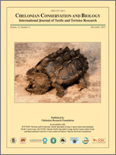
CHELONIAN CONSERVATION AND BIOLOGY
Advancing chelonian conservation for a sustainable future.Chelonian Conservation and Biology is a distinguished academic journal dedicated to advancing the field of chelonian research, encompassing conservation, ecology, and biology of turtles and tortoises. Published by Allen Press Inc in the United States, this journal is well-regarded within the realm of Animal Science and Zoology, as well as Ecology, Evolution, Behavior and Systematics, holding a commendable Q3 ranking in both categories for 2023. With an ISSN of 1071-8443 and an E-ISSN of 1943-3956, the journal features a diverse range of articles aimed at professionals, researchers, and students, fostering an understanding of the critical challenges facing chelonians worldwide. Although not an open-access publication, Chelonian Conservation and Biology provides high-quality content, including original research, reviews, and case studies, encouraging engagement and collaboration among experts. With coverage extending from 2006 to 2024, the journal serves as a vital platform for disseminating knowledge and promoting conservation efforts essential to the survival of these remarkable species.
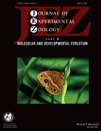
JOURNAL OF EXPERIMENTAL ZOOLOGY PART B-MOLECULAR AND DEVELOPMENTAL EVOLUTION
Championing research that shapes the future of zoological studies.JOURNAL OF EXPERIMENTAL ZOOLOGY PART B-MOLECULAR AND DEVELOPMENTAL EVOLUTION, published by Wiley, is at the forefront of research in the fields of molecular biology, developmental biology, and evolutionary science. With an impressive impact factor reflective of its significance, this journal maintains a prominent position in the academic landscape, evidenced by its Q1 ranking in Animal Science and Zoology, as well as Ecology, Evolution, Behavior and Systematics for 2023. It rigorously publishes innovative research spanning a wide array of topics pertinent to molecular and developmental evolution, making it an invaluable resource for researchers, professionals, and students alike. This journal not only offers Open Access options, enhancing the visibility of groundbreaking findings, but also supports interdisciplinary collaboration by integrating insights from genetics and molecular medicine. With a commitment to advancing knowledge, the journal is poised to contribute significantly to our understanding of biological processes and evolutionary dynamics through its convergence of research from 2003 to 2024.

Frontiers in Ecology and Evolution
Pioneering research at the intersection of ecology and evolution.Frontiers in Ecology and Evolution, published by FRONTIERS MEDIA SA, stands as a premier open-access journal dedicated to the exploration and discourse in the interdisciplinary fields of ecology and evolutionary biology. With its inception in 2013, this journal has rapidly ascended to a prestigious position, securing a Q1 ranking in both Ecology and Ecology, Evolution, Behavior and Systematics categories, reflecting its influential impact in the respective fields. Operative from Switzerland, Frontiers in Ecology and Evolution enables researchers, professionals, and students to access high-quality research without barriers, promoting collaboration and innovation. The journal covers a broad range of topics, from ecological dynamics to evolutionary strategies, facilitating profound insights that drive scientific advancement and understanding. With a remarkable position in Scopus rankings—ranking #218 in Ecology, Evolution, Behavior and Systematics and #145 in Environmental Science—this journal is essential for anyone keen on contributing to or staying updated with contemporary research in ecology and evolution.